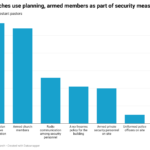
Here’s one simple strategy for increasing longevity in ministry: Leverage your strengths and recruit for your weaknesses.
By Shelly Melia
If you came to my office, you might notice a large collection of 5k, 10k, half-marathon, and marathon medals hanging across one wall. The medals look impressive and often generate questions and spark conversation. I wish I could point to at least one of the medals and tell an inspiring story about digging deep, sprinting to the finish line, and winning a race. However, none of the medals hanging on my wall are there because I won a race. Each medal simply represents a race I finished.
When I was a sophomore in college, God called me to full-time kids ministry. Responding to God’s call and beginning the race was easy. Finishing the race, on the other hand, is a formidable and lifelong challenge. When I need encouragement or inspiration to keep putting one foot in front of the other, I remember Philippians 1:6: “I am sure of this, that he who started a good work in you will carry it on to completion until the day of Christ Jesus” (CSB).
Ten years ago, God graciously opened a door for me to teach future ministers to kids and families. The practical advice I offer students to increase longevity in ministry is summed up in this simple strategy: Leverage your strengths and recruit for weaknesses.
What does this strategy require?
- Ground yourself in your calling. Humble confidence in your call to ministry is essential if you want to persevere in ministry. If you are uncertain about your calling, ask God to clearly confirm it in your heart. When difficulties in ministry seem overwhelming or you want to quit, return to the unwavering conviction of God’s calling on your life.
- Discover your unique strengths and spiritual gifts. Leadership assessment tools and spiritual gift inventories can be a great help in identifying areas of strength. Talk through results with a trusted mentor for insight and affirmation of the results. Pay attention to those experiences in ministry when it’s obvious you are operating out of your sweet spot.
- Embrace your weaknesses as an opportunity to experience the genius of 1 Corinthians 12. Leadership is stewardship, and no leader is to be so dominant that the giftings of others are wasted or overlooked. If we fail to acknowledge our weaknesses, we rob members of the body of Christ of the opportunity to unleash their spiritual giftings.
Caution: Overestimating the effectiveness of your strengths or underestimating the negative impact of your weaknesses derails the strategy. An accurate view of strengths and weaknesses is essential for keeping the strategy on track. Solicit feedback and constructive criticism to address blind spots.
What else should I know?
- A ministry centered around your strengths will never grow beyond you. Decentralize the ministry away from an overreliance on what only you can do. Burnout occurs when we carry too much of the weight of the ministry on our shoulders. How much of the ministry could go on if you suddenly were not there?
- Winning teams recruit and release specialists to carry out important roles. Ask God to open your eyes to the unique giftings of each person on your team. Sometimes we are hesitant to let other people shine because it feels threatening to our leadership. Would you be where you are today without a leader’s willingness to allow you to develop and flourish?
- Develop before you delegate. Delegation is essential for growing ministries, but it can also be risky for the leader. Have you ever delegated a task and the person dropped the ball? Bad experiences with delegation often cause leaders to decide it is easier and more efficient to do everything themselves. How can we minimize the potential for delegation to add stress and frustration to an already difficult job? Take time to develop the person and giftings before you delegate important responsibilities. Development of the person often includes specialized training for the assigned role, measured exposure to increasing levels of responsibilities, and accountability for deadlines and deliverables.
Let’s put it into practice!
- Use a whiteboard or large posterboard to brainstorm an exhaustive list of all the needed gifts and specialized roles necessary to carry out the vision of your ministry. If looking at the vision of your ministry seems too broad, consider using one large ministry event. Vacation Bible School is an example of a large event requiring many specialized roles and giftings. Take plenty of time to complete this important part of the exercise.
- Add names of people beside the roles in which they currently serve.
- Next, color code each role or gifting on the list as red, yellow, or green. Red designates missing links. Yellow indicates potential for specialization with a need for further development. Green signals areas of strength.
- Use the visual inventory to make observations about the people on your team. Are you relying too heavily on a few people or is there anyone in the wrong spot?
- Map out plans for leveraging the green, developing the yellow, and intentionally recruiting to reduce the number of red areas.
Caution: Resist the temptation to measure progress by merely plugging holes on your list. Be intentional and place people in a spot most closely aligned with their strengths, giftings, and passions. To return to the runner’s analogy: Avoid asking people to run a race God has not marked out for them. Leveraging strengths and recruiting for weaknesses empowers and equips people to finish the race God designed and planned uniquely for them.
For permission to republish this article, contact Marissa Postell Sullivan.













